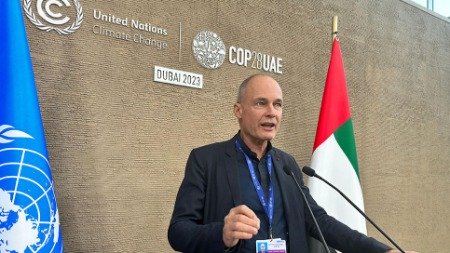News - November 30, 2023
Clean and Profitable solutions over expensive problems: Bertrand Piccard and the Solar Impulse Foundation present a New Narrative to overcome reluctance towards climate action


Written by Daniela Diego
To read in French click here:
Dubai, UAE. December 30, 2023 – During the World Climate Summit at COP28, Bertrand Piccard, psychiatrist, explorer, and President of the Solar Impulse Foundation, is presenting to the attending Heads of State a new narrative for climate action, one that recognises the ecological transition as an economic opportunity, not an expensive burden to be suffered through. Across 20+ arguments, Piccard provides the tools to help convince decision makers of the importance of climate action.
Climate action has been portrayed at times as difficult, expensive, and sacrificial for comfort, mobility, and economic development. This has led, in some parts of the world and some part of societies, to reluctance from a number of countries, industries and citizens, and may have hindered the level of ambition of previous climate conferences.
With this playbook, the Solar Impulse Foundation aims to provide climate actors with a new narrative, demonstrating the exciting opportunities afforded to all by the ecological transition.
“There are people – decision makers and citizens alike – that question whether bold climate action will not harm their prospects. It is vital to take opponents’ worries into consideration, listen to their arguments, and respond using their own language – one of job creation and economic development. It is a question of inventing a new narrative to replace one that, for these groups, has never worked,” said Bertrand Piccard, Chairman of the Solar Impulse Foundation.
Thanks to the new efficient solutions made available today by science and innovation, it has become possible to protect the environment in a financially profitable way.
Today, the world is still running on old and inefficient infrastructures, wasting close to 75% of the energy and more than 30% of the food produced, depleting natural resources, and destroying biodiversity. The aim is to modernise our world, bridging the gap from the past to the present. By introducing more efficiency, the modernisation of our systems will make them more profitable and will bring decarbonisation as a logical consequence of this modernisation more than an ecological end objective.
“We need to continue speaking about climate action, and to do so not just more, but also better. Public support for the green transition is key to its success, and we need to make sure that our policies are fair and leave no one, and nowhere, behind. By engaging with our industry and our citizens, we can change the narrative : climate action is not just about efforts and costs, it is also about solutions, opportunities and innovation,” said Maroš Šefčovič-Vice President of the European Commission.
Effective mobilisation hinges on highlighting the concrete advantages - especially economic - of implementing solutions that reduce environmental footprint, including in renewable energy and energy efficiency. A decade ago, this was not obvious; today, thousands of solutions exist, such as the ones labelled by SIF, that can usher the world, from the North to the South, in a new era of job creation and business opportunities, benefiting both public and private sectors. This dynamic shift will not only empower investors and consumers but also catalyse a surge in demand for innovation across affluent and emerging markets.
“Climate change presents us with one of the most significant challenges of our time, but it also offers an unparalleled opportunity for innovation, economic growth, and social progress. We must shift our perspective from seeing climate action as a burden to recognizing it as a catalyst for positive transformation. By embracing sustainable practices and green technologies, we can create a future that is not only environmentally sound but also economically vibrant and equitable for all. It is imperative that we leverage this moment to drive forward a narrative of opportunity, inspiring action, and optimism in the face of a changing climate,” said Razan Al Mubarak, president of the International Union for Conservation of Nature (IUCN) and UN Climate Change High-Level Champion.
By underscoring the practical gains associated with sustainable practices, leaders can pave the way for a more optimistic and actionable approach to combating climate change. It is crucial to understand that, even if there were no climate change, it would make economic sense to replace what is polluting and expensive by what is protecting the environment in a financially profitable way.
“Scepticism about the green transition is still strong. There is still a perception that we need to let go of our wealth, our comfort, to liquidate industry, to reduce economic development. People are fed up with this narrative. No one wants to make sacrifices, not even those who seriously believe in climate change. Our task is to highlight the gap between the reality and the misconceptions. Through rigorous research, transparent communication, and tangible examples, we can demonstrate the viability and profitability of existing efficient solutions, and show that these fears are unfounded,” adds Piccard.
Amongst other topics discussed, the New Climate Narrative includes the following approaches to talking about climate change:
Efficiency over sobriety (sacrifice) – While sobriety requires sacrifices, usually from the most vulnerable, efficiency can deliver a qualitative economy that uses fewer resources whilst improving purchase power and quality of life.
New professions versus lost jobs – Upskilling and reskilling of workers will be a beneficial factor in both the pace and location of the ecological transition.
It’s about saving humanity, not saving the planet – When we speak of saving the planet, we must be clear that we actually speak of saving humanity and preserving our quality of life.
Throughout its conclusion, the New Climate Narrative offers a comprehensive glossary to replace the terms that frighten the opponents by words inspiring them in order to communicate climate action more efficiently and influence public perception and acceptance. These include:
Decarbonisation by Modernisation
Cost by Profitable investment
Problems by Solutions
Crisis by Opportunity
Threatened jobs by New professions
Next generations by Current generations
Sacrifice by Advantages
Degrowth by Qualitative Economy
Sobriety by Efficiency
To read the full new climate narrative and other activities happening at COP 28, visit our website.

Written by Daniela Diego on November 30, 2023


